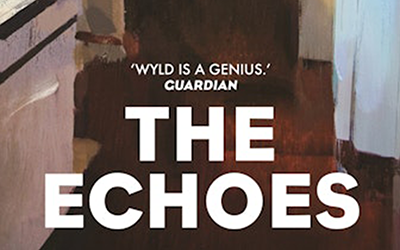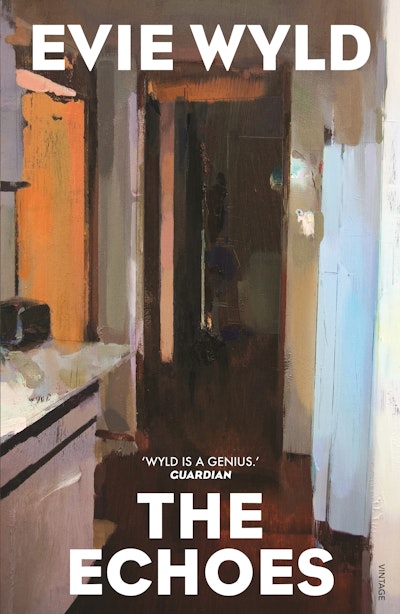
- Free Article: No
- Contents Category: Fiction
- Review Article: Yes
- Article Title: Violence and desire
- Article Subtitle: Echoing the Australian gothic
- Online Only: No
- Custom Highlight Text:
When we first meet Max in Evie Wyld’s The Echoes, he is dead. He does not believe in ghosts, he tells us, yet that it precisely what he is: ‘a transparent central nervous system floating about like a jellyfish’. Max lingers in the house he shared with his partner, Hannah. He tries to make his presence felt, to signal to Hannah that he is still there, but he lacks any supernatural ability. Hannah moves on with her life, and all Max can do is ‘watch as the flat becomes the home of others – the moths, the spiders, the silverfish, the dust motes and … the leftovers of the dead’.
- Featured Image (400px * 250px):

- Alt Tag (Featured Image): Diane Stubbings reviews ‘The Echoes’ by Evie Wyld
- Book 1 Title: The Echoes
- Book 1 Biblio: Vintage, $34.99 pb, 228 pp
- Book 1 Cover Small (400 x 600):

- Book 1 Cover (800 x 1200):

The Echoes is structured similarly. Drawing on her exquisite grasp of suspense, Wyld musters the stories of Hannah, her forebears and descendants, into a novel that lucidly captures the bitter-sweet arc of one woman’s life, tracing that life’s tendrils as they lace back and forth through time. More importantly, Wyld exposes the troubled relationship between white Australians and the land they have come to occupy. In this, The Echoes is not merely a poignant and beautiful novel, it is also a consequential one.
Before his death, Max lives with Hannah in a small London flat. Max teaches writing, is finicky about cooking, and imagines a future with children. Hannah once showed potential as a writer, but now she chooses to work in a bar. She has just had an abortion, without telling Max she was pregnant. Max wants them to travel to Australia so that he can meet Hannah’s family. Hannah never wants to visit Australia again.
Hannah’s childhood home – where she lives with her parents, her sister Rachel, and her mother’s volatile half-brother Tone – is situated in The Echoes, an unproductive wasteland in rural Australia, a ‘dead paddock that smells of dead goats’. Hannah and Rachel are inseparable. Their mother, Kerry, hoped her daughters would be sweet ‘little helpers … nice, clean little girls’. Nevertheless, Kerry seems content. She hides her cleverness under a layer of bafflement, fabricating a version of herself that will, she imagines, protect her from the past.
Max and Hannah’s flat is situated on a major ring-road. Unbeknown to Max, Hannah has chosen the location deliberately. It is close to the house where Hannah’s grandmother lived as a child. Since seeing a photograph of her grandmother outside the house – taken not long before the family moved to Australia – Hannah has been fascinated by her family’s history and, tellingly, by her mother’s feigned ignorance of that history. For Hannah, living near her grandmother’s old house is her way of ‘sink[ing] back into the space my grandmother left behind her’.
Salvaging the photo from a bucket of scraps set aside for the goats, Hannah conceals it inside a book about sharks. Despite living days away from the nearest ocean, Hannah is fascinated by sharks. She speculates about what might happen were a shark ever to bite her in two, leaving one half of herself adrift in the ocean. What she will feel, she soon discovers, is ‘forgotten and alone’.
Wyld’s writing is rooted in the Australian gothic without ever being defined or limited by that genre. Through the several strands of the narrative, lives echo. Time folds back on itself. The past manifests like a ghost, a fleeting, inexplicable sensation caught at the edge of experience. History’s currents and deviations ripple through time, shaping the present and the future. As Max intimates, blood that has been spilled runs through time ‘trying to find a new body to inhabit’.
This narrative effect is mirrored in images that purl through the novel: spiders, fingerprints, cycles, burial and excavation, a dress with a lemon print, ‘a small, sharp cube of green glass’, white-ridged scars and the scratching of mice. Even the novel’s abrupt and shocking climax pulses with a vein of Greek or Shakespearean tragedy.
What becomes apparent is that Hannah has not just run towards an England that seems, to her, more suited to her sensibilities and heritage. She has also escaped – or at least tried to escape – the afflictions of her own family, her dislocation from her sister, her disillusionment with Uncle Tone, and her own accompanying sense of incompleteness.
Hannah has also tacitly escaped the land itself: its barren plains, its isolation, and its tragic and inescapable history. ‘This whole fucking place,’ Tone moans to his nieces as he surveys The Echoes. ‘There’s bones all over the whole fucking place.’ The bones he is referring to are those of dead Aboriginal girls, stolen from their families, physically abused at the nearby ‘training institution’, and unceremoniously buried on the land where the family now lives. Gnarled by the abuse he suffered in his own childhood, Tone understands implicitly that this is a country built on privation and death. He knows that a nation cannot – should not – be seeded among bones; that landscapes, too, haunt.
What The Echoes ultimately reveals is the tension at the heart of the white Australian experience. No matter that we no longer belong anywhere else, any sense of our belonging to this continent will always be marred by our inability to escape the history we have created, a history whose truth will, perennially, ‘come bursting through the topsoil’.

Comments powered by CComment